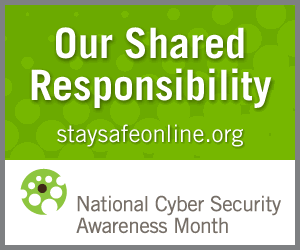It's October, It's National Cyber Security Awareness Month

National Cyber Security Awareness Month (NCSAM) – celebrated every October - was created as a collaborative effort between government and industry to ensure every American has the resources they need to stay safer and more secure online.
STOP. THINK. CONNECT.
Cybersecurity begins with a simple message everyone using the Internet can adopt: STOP. THINK. CONNECT. Take security and safety precautions, understand the consequences of your actions and behaviors online and enjoy the benefits of the Internet.
No individual, business or government entity is solely responsible for securing the Internet. Everyone has a role in securing their part of cyberspace, including the devices and networks they use. Individual actions have a collective impact and when we use the Internet safely, we make it more secure for everyone. If each of us does our part—implementing stronger security practices, raising community awareness, educating young people or training employees—together we will be a digital society safer and more resistant from attacks and more resilient if an attack occurs.
Keep a Clean Machine.
- Keep security software current: Having the latest security software, web browser, and operating system are the best defenses against viruses, malware, and other online threats.
- Automate software updates: Many software programs will automatically connect and update to defend against known risks. Turn on automatic updates if that’s an available option..
- Protect all devices that connect to the Internet: Along with computers, smart phones, gaming systems, and other web‐enabled devices also need protection from viruses and malware.
- Plug & scan: “USBs” and other external devices can be infected by viruses and malware. Use your security software to scan them.
Protect Your Personal Information.
- Secure your accounts: Ask for protection beyond passwords. Many account providers now offer additional ways for you verify who you are before you conduct business on that site.
- Make passwords long and strong: Combine capital and lowercase letters with numbers and symbols to create a more secure password.
- Unique account, unique password: Separate passwords for every account helps to thwart cybercriminals.
- Write it down and keep it safe: Everyone can forget a password. Keep a list that’s stored in a safe, secure place away from your computer.
- Own your online presence: When available, set the privacy and security settings on websites to your comfort level for information sharing. It’s ok to limit how and with whom you share information.
Connect with Care.
- When in doubt, throw it out: Links in email, tweets, posts, and online advertising are often the way cybercriminals compromise your computer. If it looks suspicious, even if you know the source, it’s best to delete or if appropriate, mark as junk email.
- Get savvy about Wi‐Fi hotspots: Limit the type of business you conduct and adjust the security settings on your device to limit who can access your machine.
- Protect your $$: When banking and shopping, check to be sure the sites is security enabled. Look for web addresses with “https://” or “shttp://”, which means the site takes extra measures to help secure your information. “Http://” is not secure.
Be Web Wise.
- Stay current. Keep pace with new ways to stay safe online. Check trusted websites for the latest information, and share with friends, family, and colleagues and encourage them to be web wise.
- Think before you act: Be wary of communications that implores you to act immediately, offers something that sounds too good to be true, or asks for personal information.
- Back it up: Protect your valuable work, music, photos, and other digital information by making an electronic copy and storing it safely.
Be a Good Online Citizen.
- Safer for me more secure for all: What you do online has the potential to affect everyone – at home, at work and around the world. Practicing good online habits benefits the global digital community.
- Post only about others as you have them post about you.
- Help the authorities fight cybercrime: Report stolen finances or identities and other cybercrime to http://www.ic3.gov (Internet Crime Complaint Center), the Federal Trade Commission at http://www.onguardonline.gov/file‐complaint.
Visit http://www.staysafeonline.org/ncsam/about for more information





